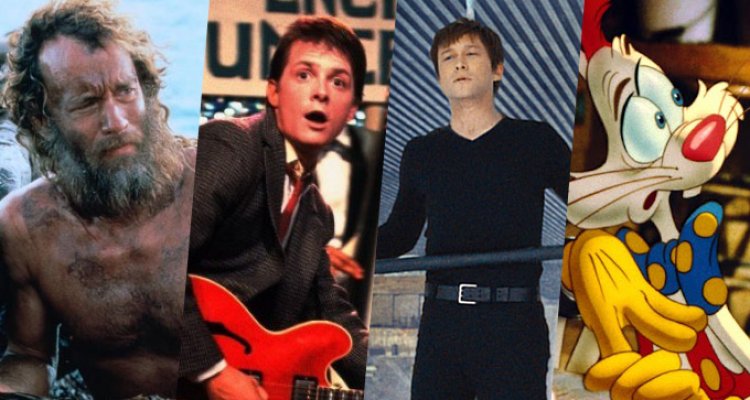 Tiptoeing gingerly into theaters this week, trying not to look down, is “The Walk,” the retelling of Philippe Petit’s incredible high-wire stunt between the twin towers of the World Trade Center in 1974. The story was previously told in the 2008 Oscar-winning documentary “Man On Wire,” but this new film, starring Joseph Gordon-Levitt as Petit, has something that the previous one didn’t: IMAX 3D technology that puts you in Petit’s shoes to dizzying, pulse-pounding effect, as our review from NYFF revealed.
Tiptoeing gingerly into theaters this week, trying not to look down, is “The Walk,” the retelling of Philippe Petit’s incredible high-wire stunt between the twin towers of the World Trade Center in 1974. The story was previously told in the 2008 Oscar-winning documentary “Man On Wire,” but this new film, starring Joseph Gordon-Levitt as Petit, has something that the previous one didn’t: IMAX 3D technology that puts you in Petit’s shoes to dizzying, pulse-pounding effect, as our review from NYFF revealed.
It’s the latest example of director Robert Zemeckis taking state-of-the-art technology and applying it to truly popular entertainment, his stock-in-trade for 35 years now. The writer-director won a Student Academy Award for his USC film, which brought him under the tutelage of Steven Spielberg, who helped him to make his debut feature “I Wanna Hold Your Hand” at the tender age of 26.
In the 1980s, Zemeckis became one of Hollywood’s biggest filmmakers, with a string of hits, most notably “Back To The Future” and its sequels before winning an Oscar (one of six the film took) for megahit “Forrest Gump” in 1994. He’s most recently been famous for helping to pioneer 3D performance capture animated features with “The Polar Express” and similar pictures, but he returned to live-action with “Flight” a few years back.
With “The Walk” in IMAX theaters now before expanding wider this weekend, it seemed like the perfect time to look back on a filmmaker who, though he’s never been a household name like Spielberg, has had almost as big an impact on pop culture, with a fascinating career of ups, downs, and creepy dead CGI eyes. Below, you’ll find our verdicts on Zemeckis’ movies, ranked from worst to best. Agree? Disagree? Let us know in the comments.
16. “A Christmas Carol” (2009)
You’d think that Zemeckis’ beloved motion capture technology would have gotten better —or at least more lifelike and less creepy— over time. Not so, as it turns out: his most recent performance capture 3D extravaganza, an adaptation of Charles Dickens’ Yuletide classic, somehow proved less realistic, more horrifying and infinitely less entertaining than the one with the Muppets. Or the Nicolas Cage-voiced animated one. Or basically all of them. Starring Jim Carrey not just as tightfisted War On Christmas-leading grump Ebenezer Scrooge, but also all three ghosts (with Gary Oldman as both Bob Cratchit and, hilariously, Tiny Tim, and with Colin Firth and Bob Hoskins in other roles), it’s in part an excuse to let Carrey off the leash. And while he’s not bad as such, it indulges some of the star’s worst instincts. The same could be said of Zemeckis, who stuffs the film with cheap, ill-fitting gags and theme-park evoking action sequences designed to show off the 3D without adding much to the story. Indeed, unlike “Beowulf” or “The Polar Express,” you know this story so well already that it’s puzzling that Zemeckis would attempt it all, especially given that he seems to have little affinity with the material. Sure, he gets the Victorian Gothic aesthetic right (which in fairness, few adaptations do), but there’s little holiday cheer at play. The film ultimately proves too close to Scrooge himself: more concerned with money than with heart.
15. “The Polar Express” (2004)
Say what you like about Zemeckis, but he is at least forward-thinking: five years before “Avatar” blew the roof off box offices worldwide, the director took advantage of performance-capture, 3D and IMAX, technologies that would soon become staples of the business, for the first of his animated trilogy, an adaptation of Chris Van Allsburg’s 1985 picture book. Unfortunately, the film is a technological showcase first, laden with gimmicks second and an effective movie third. The story involves a boy (named as Hero Boy in the credits, giving a clue to the film’s depth) from a perfect ’50s suburbia who boards a mysterious train that stops on his street and takes him and other children to the North Pole and to meet Santa. The technical bravado certainly proved a novelty, as was the chance to see Tom Hanks play most of the roles, but famously, the eerily dead eyes of the characters prove off-putting to an alarming degree (almost as creepy as the surprisingly fascistic overtones of Santa’s North Pole itself). More importantly, Zemeckis never finds a way to turn a 32-page storybook into a 100-minute movie, filling the film with incident but not much in the way of interest. And while the slides and trains and whatnot might have amused the young’ uns at the time, it’s another Christmas film from the same time that’s endured in place of this one —the rather more modest “Elf.”

